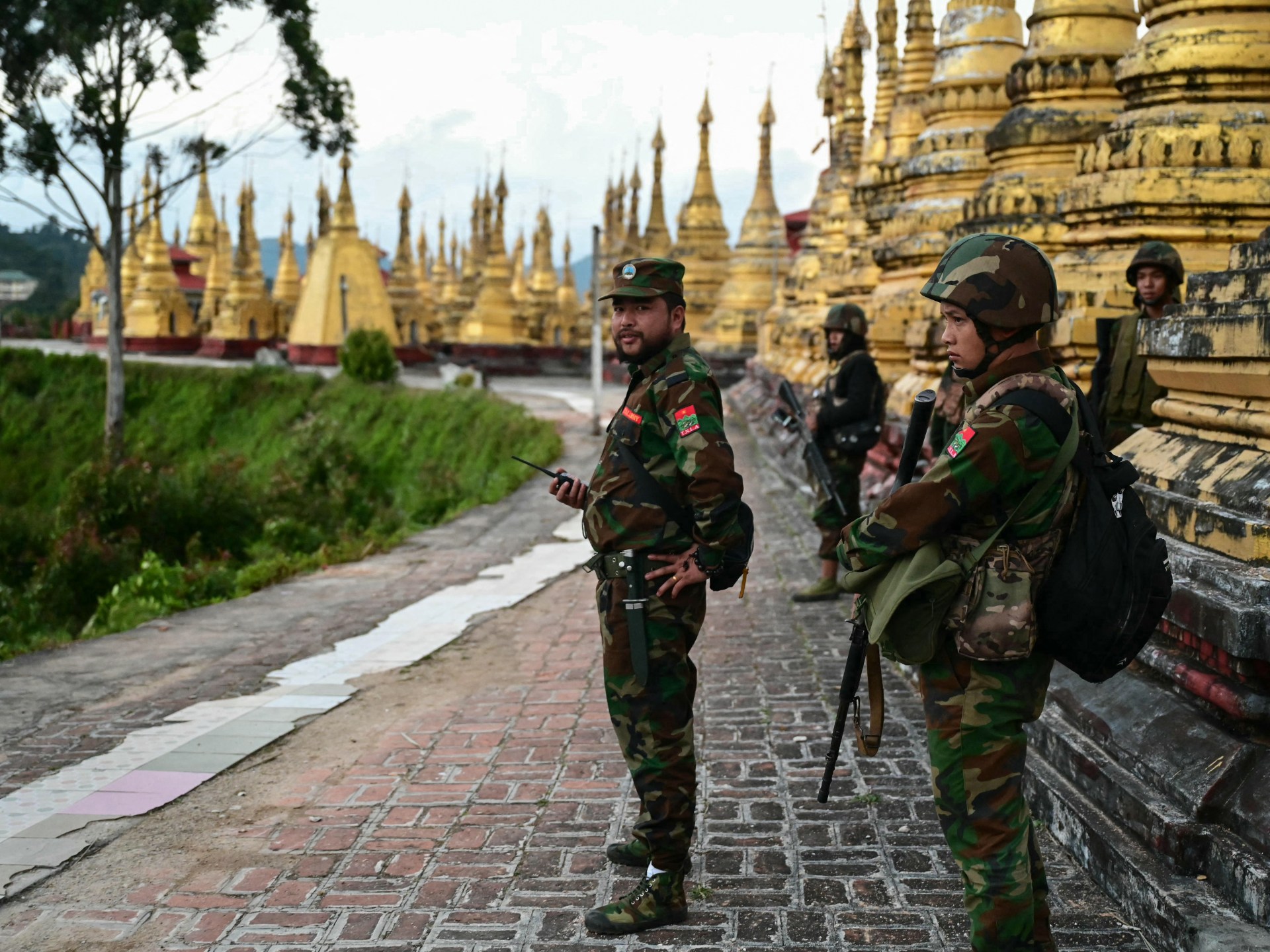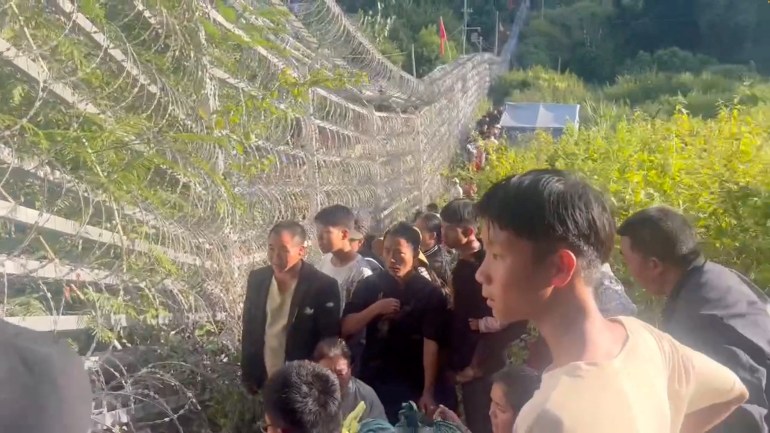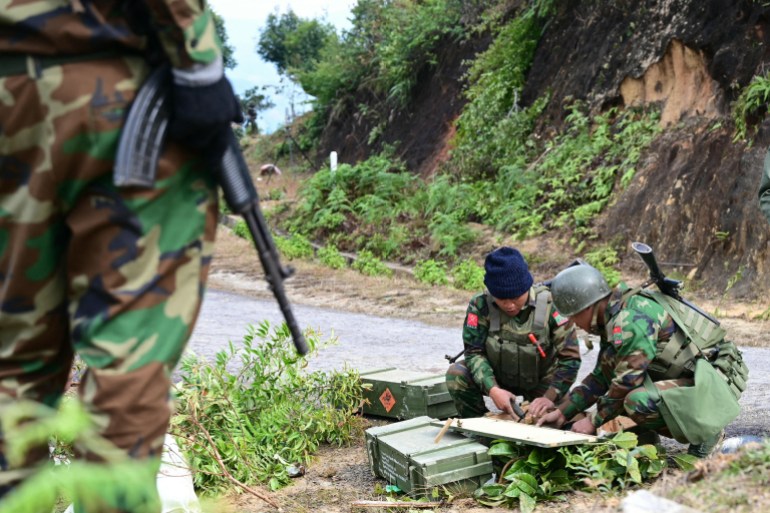
Bangkok/Taipei – China has emerged as the dominant foreign power in shaping possible outcomes in Myanmar’s deepening political crisis, as Beijing seeks to exert its influence on several armed groups that have posed the biggest challenge since they seized power in a February 2021 coup for the generals.
Last week, Beijing urged the three powerful ethnic armies – the Arakan Army (AA), the Mandarin-speaking Myanmar National Democratic Alliance Army (MNDAA) and the Ta’ang National Liberation Army (TNLA) – to agree to a ceasefire after militants cooperated with them Anti-coup coalitions across Myanmar pushed Senior Gen. Min Aung Hlaing’s military out of parts of the north, overran hundreds of military outposts and seized control of border crossings with China Operation 1027.
China’s ceasefire announcement followed talks in the southwestern city of Kunming between the State Administration Council (SAC), as Myanmar’s coup plotters call themselves, and the Three Brotherhood Alliance, the coalition of AA, MNDAA and TNLA that is pushing the 1027 offensive.
“China supports the peace process in northern Myanmar and has supported and facilitated dialogue and contacts between relevant parties in Myanmar,” Chinese Foreign Ministry spokesman Mao Ning said in a statement on December 14, confirming that “a temporary “Ceasefire” had been reached.
Beijing’s prominent involvement in the ceasefire and its armed support for both ethnic armies and the SAC make China by far the most influential foreign actor in the unrest in Myanmar, a strategic location where major powers have long jockeyed for influence and whose generals have been Deepening relations with Russia.
SAC Foreign Minister Than Swe was in Beijing at the beginning of December.
“The ceasefire followed the junta foreign minister’s visit to Beijing, where he sought China’s help, and a series of interactions by the Chinese government with the MNDAA and its allies,” said Jason Tower, country director for Myanmar at the United States Institute of Peace.
Patronage networks
The ceasefire also came days after Beijing issued arrest warrants for 10 associates and cronies of the Myanmar military, including members of the five powerful families that jointly ruled Kokang on the border with China’s Yunnan province. The most notable target was Bai Suocheng, a key ally of Min Aung Hlaing, an indication of the complex layers of ties and patronage between China, Myanmar’s ethnic minorities in the border areas and the generals.
“China is really angry with the regime Fraud centers and related crime. Myanmar has become synonymous with fraud in China,” a source close to the Chinese government told Al Jazeera.
“The SAC underestimated how angry Beijing is about the waves of Chinese nationals being held at the border,” the source added.
While Operation 1027 represents the biggest challenge to military rule since Min Aung Hlaing’s coup, it came amid a surge in violence Drug and human trafficking in lawless border areas, which can also be felt elsewhere in the region.
Since the coup, and as Myanmar becomes increasingly isolated by international sanctions and excluded from many of its traditional partners in Southeast Asia, the generals have moved closer to Beijing, which has snubbed the Government of National Unity (NUG) – a parallel government installed by elected lawmakers. mainly from the National League for Democracy, who were removed by the coup. The NUG established the People’s Defense Forces (PDFs), armed groups composed of civilians who opposed the coup and trained and fought alongside ethnic armed organizations.
All eyes are now on the MNDAA, the de facto leader of the 1027 Offensive. It was founded by Peng Jiasheng, the strongman who ruled Kokang before he was overthrown by Min Aung Hlaing and Bai Suocheng in 2009 and died last year.
Tower said the offensive’s apparent breakthrough and the unprecedented level of cooperation among Myanmar’s resistance forces, including fighters from Myanmar’s dominant Bamar ethnic group, would likely make it “extremely problematic” for the group to agree to any kind of pact with the military leadership .
“Ethnic armies in northern Shan State, including the MNDAA, have relied heavily on popular resistance forces in Shan and Mandalay in central Myanmar for their success on the battlefield,” he said. “Therefore, any deal with the junta will result in significant costs for the MNDAA in terms of its relationships and obligations to its partners.”

The PDFs in Mandalay directly participated in the offensive by holding and cutting off trade routes to deny the SAC the ability to self-supply and provide logistical support against the MNDAA, which has trained an entire brigade of non-Chinese-speaking troops.
Beijing’s dramatic turn against members of the so-called “four families” – the Bai, Wei and two Liu families – in Kokang came after they had been allowed to control the region for more than a decade with China’s blessing. The Ming family rose to prominence more recently.
Pro-China news site HK01 said the families together “formed industrial chains for pornography, gambling, drugs and fraud.”
“Whether the illicit industries of several large families that have been entrenched in Kokang for many years can be eradicated in light of China’s vigorous crackdown on electronic fraud crimes and the war in northern Myanmar has become a major focus of the outside world,” said HK01, which is one with China affiliated investment firm.
In recent weeks, China has drastically changed its portrayal of the Kokang leaders. In December, the five families were publicly punished and arrested. Ming
Yangon-based Chinese-language magazine Golden Phoenix, a staunch voice of China, picked up on the narrative shift with the headline: “Is the annihilation of the four major families imminent?”
“China is fully capable of vetoing any measures of the MNDAA. The Tatmadaw knows this,” said a Chinese academic in Yangon who did not want to be named due to the sensitivity of the matter. The Myanmar military is sometimes referred to as the Tatmadaw.
“In May this year, then Chinese Foreign Minister Qin Gang visited Myanmar. At the time, outside observers thought China had decided to fully side with SAC. In fact, China put pressure on the SAC,” they told Al Jazeera.

The source in Beijing said China would be a priority now that fraud centers and criminals had largely been tackled Border stability and that Beijing disagreed with the NUG despite having previously developed a solid relationship with ousted civilian leader Aung San Suu Kyi.
The fighting continues
The question is whether Beijing – which supplies the ethnic armies with weapons – will be able to effectively end hostilities if resistance forces across Myanmar continue to fight and believe they have the momentum to achieve further success.
Days after the ceasefire was signed, the TNLA said it had taken control of the town of Namhsan in northern Shan State as well as the so-called 105-mile trade zone, a key trading area on Shan State’s border with China.
Security expert Anthony Davis pointed out that China’s role in the logistical support reaching the ethnic armies was largely indirect but significant.
“The most important level of plausible deniability centers on the role of the United Wa State Army (UWSA), fully equipped with modern weapons and equipment from China, while also acting as an ally and quartermaster for them. several ethnic factions in the north, not least the Brotherhood Alliance,” Davis told Al Jazeera.
The UWSA – a formidable Chinese-speaking microstate – has supported the MNDAA in the recent offensive, including by taking in refugees fleeing the fighting.
“Given its strong influence over the UWSA, China could undoubtedly achieve a significant reduction in munitions reaching northern groups if it wanted to. “Obviously it’s not interested in taking action,” Davis said.

The NUG, meanwhile, says it is time for Beijing to recognize this Damage occurs by the military and support a path to democracy.
“The longer the generals stay in power, the more they pose a serious threat to China, as the SAC has repeatedly proven itself to be the source of all crimes in Myanmar,” Dr. Sasa, Minister of International Cooperation of the NUG, in an interview with Al Jazeera.
“It is time for China to accept the will of the people of Myanmar and support their only representatives – the NUG – to end these threats and build a federal democracy that brings peace, stability and prosperity to China, Myanmar and the region will bring.”






Recent Comments